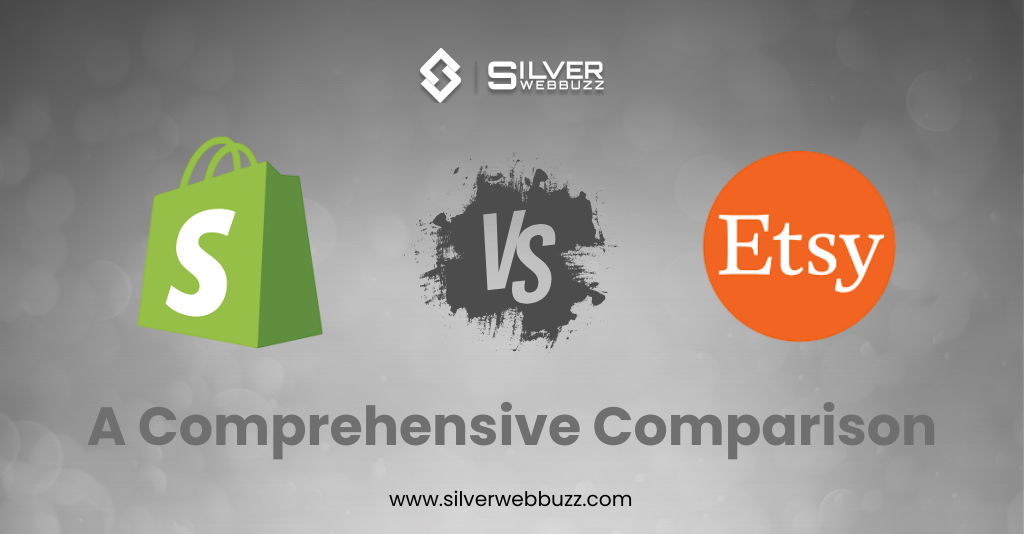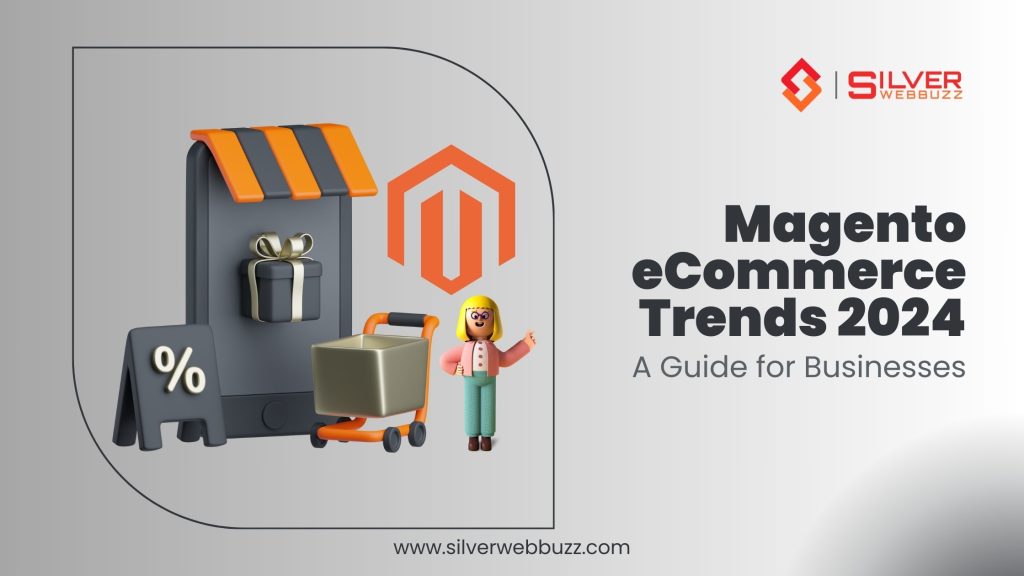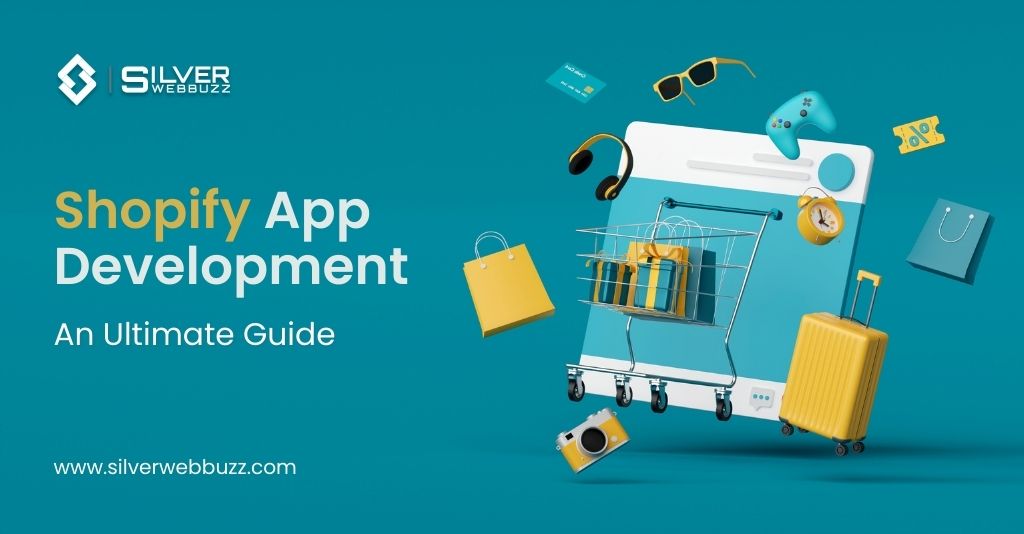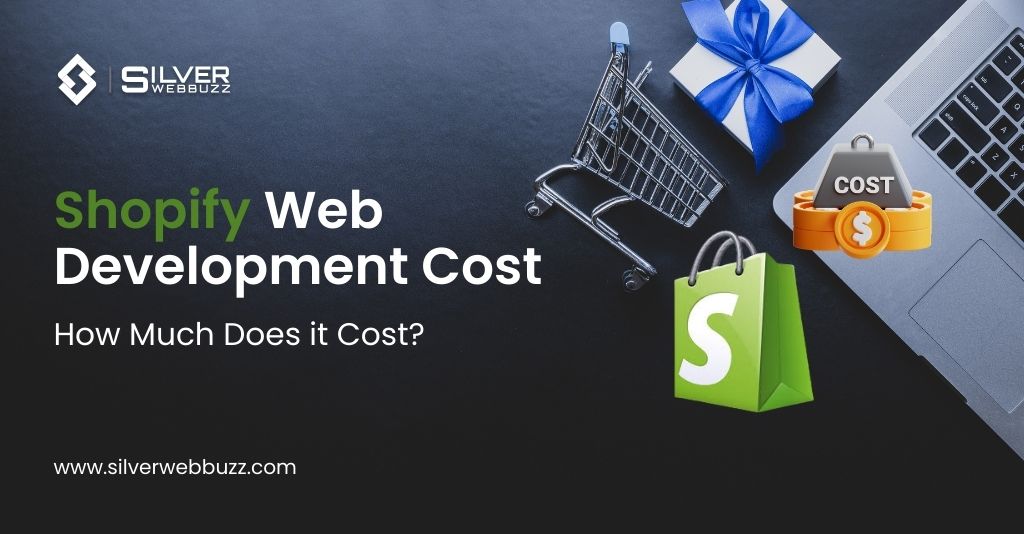When starting an online business, choosing the right platform is crucial. Shopify vs Etsy are two of the most popular eCommerce options, each catering to different types of sellers. Shopify is a fully customizable eCommerce platform that allows businesses to create their own online store, manage inventory, and control branding. It is ideal for those looking for a scalable and independent online presence.
On the other hand, Etsy is an online marketplace designed for handmade, vintage, and craft-related products. It provides access to a built-in audience, making it easier for small artisans and crafters to sell without investing heavily in marketing. However, it has limitations in terms of customization, branding, and seller control.
The decision between Shopify Vs Etsy depends on various factors, including product type, budget, and long-term business goals. Shopify offers flexibility and growth potential, while Etsy provides an easy-to-use marketplace with immediate customer reach. This comparison will explore key differences in pricing, features, ease of use, and overall benefits to help you determine which platform best suits your business needs.
What is Shopify?
Shopify is a powerful eCommerce platform that allows businesses to create their own online stores. It provides users with full control over their website, branding, and customer experience. Shopify is highly customizable, making it a preferred choice for entrepreneurs looking to establish a unique online presence.
Key Features of Shopify:
- Custom domain and branding control
- Wide range of themes and design customization
- Multiple payment gateways
- SEO and marketing tools
- Inventory management system
- Mobile-friendly and responsive design
- Integrated analytics and reporting tools
Key Advantages of Using Shopify
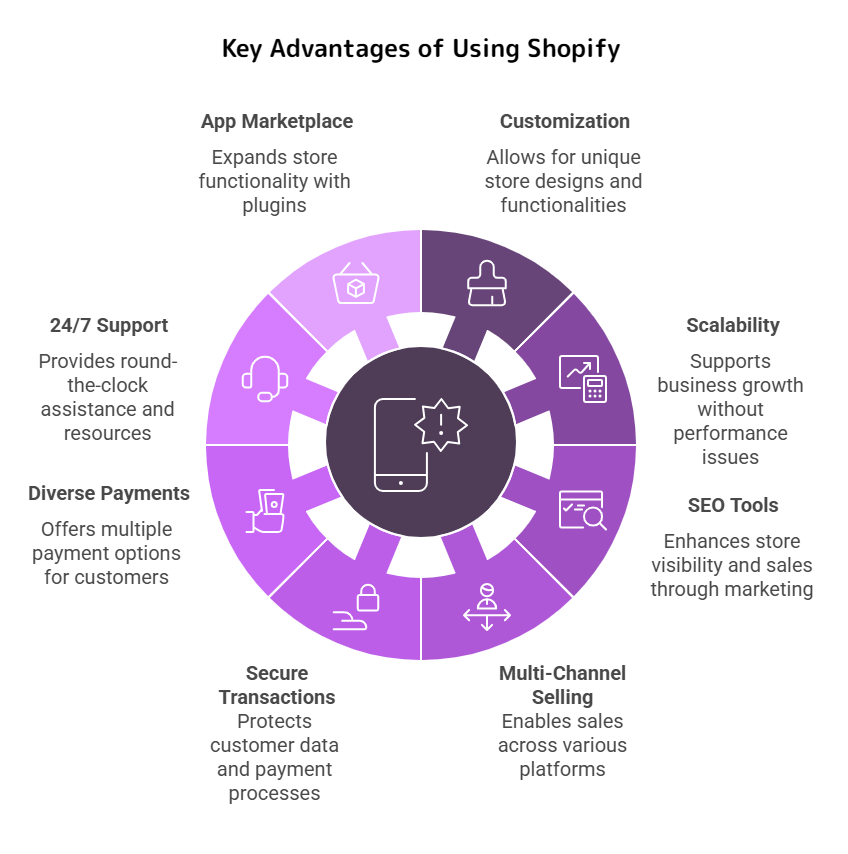
Shopify is a robust eCommerce platform designed to provide businesses with a highly customizable and scalable solution. Whether you’re a small business or a large enterprise, Shopify offers a range of features that enhance the online selling experience. Below are the key advantages of using Shopify:
- Full Customization & Control: Shopify gives you complete control over your website’s design, layout, and functionality. You can customize themes, add apps, and modify code to create a unique shopping experience.
- Scalability & Growth Potential: Shopify is built to grow with your business. Whether you start with a small store or expand to a large-scale enterprise, the platform supports high traffic and sales volume without performance issues.
- SEO & Marketing Tools: Shopify provides built-in SEO features, advanced analytics, email marketing integrations, and social media advertising tools to increase your store’s visibility and drive sales.
- Multi-Channel Selling: Shopify enables you to sell across multiple platforms, including Amazon, eBay, Facebook, Instagram, and even brick-and-mortar stores through Shopify POS.
- Secure & Reliable Transactions: With Shopify’s SSL certification and PCI compliance, your store remains secure, protecting customer data and payment transactions.
- Diverse Payment Options: Shopify supports multiple payment gateways, including Shopify Payments, PayPal, Stripe, and cryptocurrency options, ensuring seamless transactions for customers worldwide.
- 24/7 Customer Support & Resources: Shopify provides round-the-clock customer support via chat, email, and phone. Additionally, the platform offers a wealth of resources, tutorials, and a thriving community for sellers.
- App & Plugin Marketplace: The Shopify App Store offers thousands of apps and plugins to enhance store functionality, from inventory management to customer loyalty programs.
- Mobile Optimization: Shopify ensures a mobile-friendly shopping experience with responsive themes and mobile app integrations, making it easier for customers to shop on any device.
- Dropshipping & Print-on-Demand Compatibility: Shopify integrates seamlessly with dropshipping services like Oberlo and print-on-demand platforms, allowing businesses to operate without holding physical inventory.
If you need a professional, high-performing online store, working with a Shopify development company can help you build a tailored solution. Many businesses choose to hire Shopify developers to optimize their store’s performance and user experience.
What is Etsy?
Etsy is a globally recognized online marketplace that specializes in handmade, vintage, and unique products. It was founded in 2005 and has since grown into a major eCommerce platform catering to independent artists, crafters, and small businesses. Unlike Shopify, which allows users to build their own branded online stores, Etsy functions as a shared marketplace where sellers list their products alongside other vendors.
Etsy’s business model revolves around community-driven commerce, connecting creative entrepreneurs with buyers looking for one-of-a-kind items. The platform focuses on user-friendly selling, requiring minimal technical skills, making it an attractive option for individuals who want to start an online business without the complexity of managing a full-fledged eCommerce website.
Key Features of Etsy:
- Pre-established marketplace with a built-in audience
- Easy-to-use platform for quick setup
- Focus on handmade, vintage, and unique products
- Community-driven buyer and seller interaction
- Minimal technical skills required
Key Advantages of Using Etsy
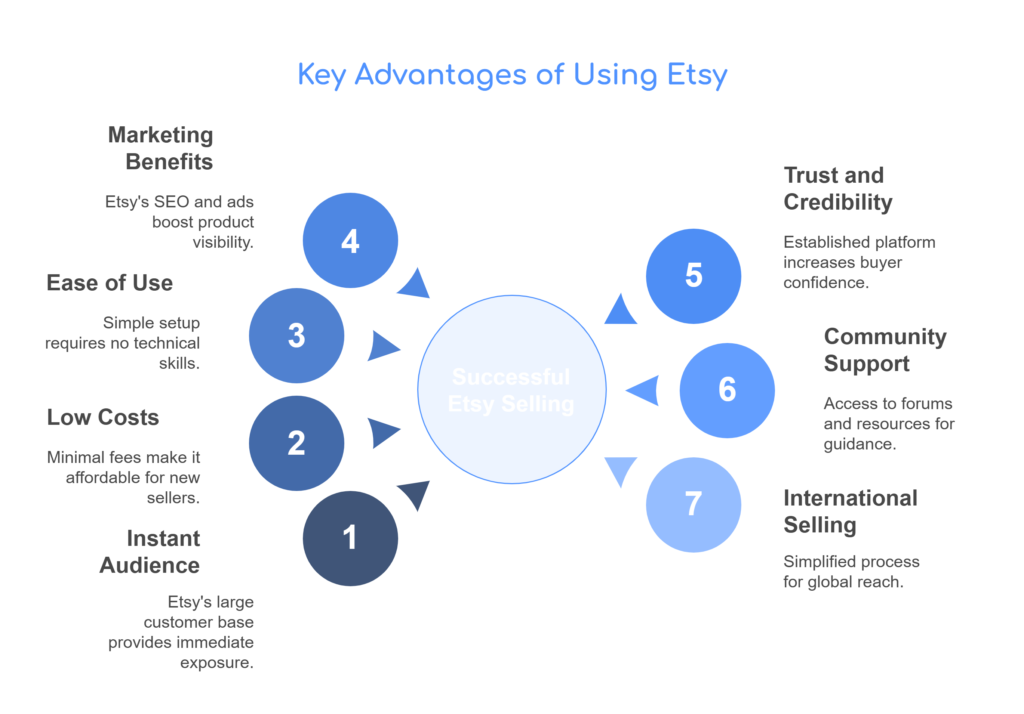
Selling on Etsy comes with numerous advantages, especially for small businesses and independent creators who want to reach a niche audience. Here are the top benefits of choosing Etsy as your selling platform:
- Instant Audience and Built-in Traffic: Etsy has a massive customer base actively searching for handmade, vintage, and unique products. Unlike Shopify, where you need to drive traffic to your store, Etsy provides built-in marketplace exposure.
- Low Startup Costs: Etsy does not require upfront investments in website development or hosting. There are no monthly subscription fees like Shopify; instead, sellers pay small listing and transaction fees, making it a budget-friendly option for new entrepreneurs.
- Ease of Use and Quick Setup: Setting up a store on Etsy is straightforward. You don’t need advanced technical skills or website development experience, as Etsy handles all the backend operations for you.
- Marketing and SEO Benefits: Etsy’s marketplace is optimized for search engines, allowing sellers to benefit from organic traffic. Additionally, Etsy provides built-in advertising options, including Etsy Ads and offsite promotions, to increase product visibility.
- Trust and Brand Credibility: Etsy is a well-known and trusted marketplace, which helps increase customer confidence and conversion rates. Buyers feel more comfortable purchasing from an established platform compared to a newly launched independent Shopify store.
- Community Support and Seller Resources: Etsy offers extensive support, including seller forums, educational resources, and analytics tools to help business owners optimize their sales and marketing strategies.
- International Selling Made Easy: Etsy simplifies the process of selling to international customers by handling currency conversions, shipping integrations, and global visibility, making it easier for sellers to expand their business worldwide.
While Etsy is a great platform to start an online business, many entrepreneurs eventually move to Shopify for more control over branding, marketing, and scalability. Some sellers choose to use both platforms simultaneously, leveraging Etsy’s marketplace while running an independent Shopify store for brand expansion. If you are looking to create a customized and scalable online store, partnering with a Shopify development company or deciding to hire Shopify developers can help you transition smoothly from Etsy to Shopify.
Shopify vs Etsy: Key Differences Explained
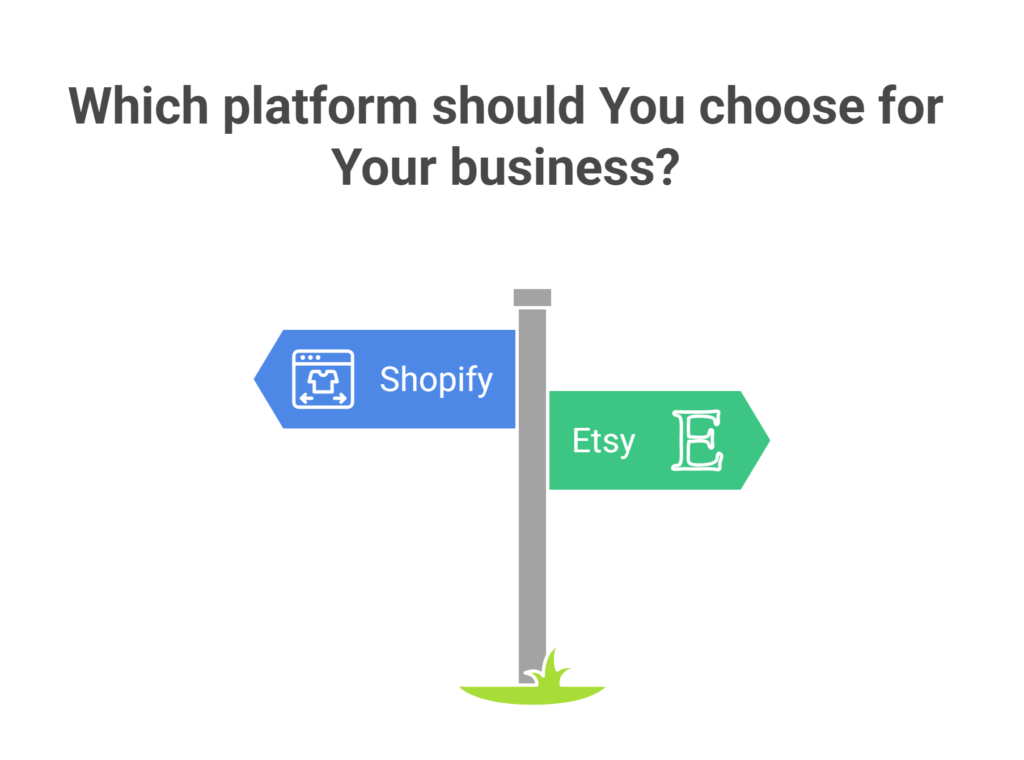
When comparing Shopify vs Etsy, it’s important to understand their fundamental differences to determine which platform suits your business best. Shopify is a dedicated eCommerce platform, while Etsy is a marketplace that connects sellers with buyers. Here’s a detailed breakdown of their key differences:
1. Customization and Branding
- Shopify: Provides full customization, allowing businesses to create a unique website with personalized branding, themes, and domain names.
- Etsy: Offers limited customization since all stores follow the Etsy marketplace structure, making it difficult to establish a distinctive brand identity.
2. Control and Independence
- Shopify: Gives sellers complete control over their store, pricing, and policies. You own your website and customer data.
- Etsy: Sellers must follow Etsy’s guidelines, policies, and fee structures. Etsy also controls the marketplace algorithms and visibility of products.
3. Fees and Pricing
- Shopify: Charges a monthly subscription fee, ranging from $29 to $299, depending on the plan. Additional transaction fees apply if third-party payment gateways are used.
- Etsy: Charges listing fees ($0.20 per item), transaction fees (6.5% per sale), and payment processing fees, which can add up over time.
4. Marketing and SEO
- Shopify: Offers built-in SEO tools, email marketing, and social media integration, giving sellers full control over their marketing strategies.
- Etsy: Relies on its marketplace traffic. While Etsy offers advertising options, sellers have limited control over marketing strategies and search visibility.
5. Product Restrictions
- Shopify: Allows sellers to list a wide range of products, including physical goods, digital downloads, and services.
- Etsy: Only permits handmade, vintage (20+ years old), and craft supplies. Sellers must comply with Etsy’s strict product policies.
6. Scalability and Growth Potential
- Shopify: Designed for scalability, allowing businesses to grow, integrate third-party tools, and expand sales channels beyond their website.
- Etsy: Growth is limited within the marketplace, and sellers must follow Etsy’s changing policies and algorithms, which may impact their business.
7. Customer Relationship and Data Ownership
- Shopify: Gives merchants full ownership of customer data, enabling personalized marketing and retargeting.
- Etsy: Etsy owns customer data, limiting direct marketing opportunities for individual sellers.
These differences make it clear that Shopify vs Etsy cater to different business needs. If you seek complete control and scalability, hiring a Shopify development company can help you build a robust eCommerce store. Many entrepreneurs hire Shopify developers to customize their store for better performance and user experience. On the other hand, if you want an easy-to-use marketplace with a built-in audience, Etsy might be the better option.
Woocommerce vs Shopify: Which Platform is Right for Your Online Store?
Shopify or Etsy: Which Platform Should You Choose?
Choosing between Shopify vs Etsy is a crucial decision for any online seller. Both platforms serve different purposes and cater to different types of businesses. If you prioritize full control over branding, website customization, and scalability, then Shopify is the better choice. Shopify allows you to design a professional-looking eCommerce store, integrate multiple sales channels, and leverage advanced SEO and marketing tools.
On the other hand, Etsy is a marketplace that is ideal for sellers who specialize in handmade, vintage, or craft supplies. It offers a built-in audience and an easy-to-use interface, making it a great option for beginners who want to test the market without significant upfront investment.
Additionally, Shopify provides the flexibility to grow your business at your own pace, while Etsy comes with restrictions on product types and branding. Many businesses choose to work with a Shopify development company to ensure that their online store is fully optimized for performance. If you want a professional store, you can hire Shopify developers to build a custom eCommerce solution that aligns with your business goals.
Ultimately, the best platform depends on your long-term vision, budget, and the type of products you sell. Some businesses even use both platforms simultaneously—leveraging Etsy for marketplace exposure while running a Shopify store for brand independence.?
Conclusion
Both Shopify vs Etsy offer unique benefits for online sellers. If you are serious about building a brand and growing an independent eCommerce store, Shopify is the better option. Working with a Shopify development company like Silver WebBuzz can help you create a customized online store tailored to your business needs. However, if you are just starting and prefer a low-cost, low-maintenance option, Etsy is a great platform to test your products in the market.
Ultimately, your choice should align with your business goals, product type, and growth strategy. Many entrepreneurs choose to hire Shopify developers to get the best out of their eCommerce journey. Whether you opt for Shopify or Etsy, success depends on effective marketing, quality products, and exceptional customer service.
